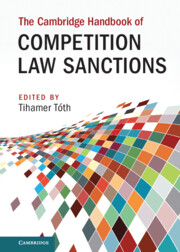Book contents
- The Cambridge Handbook of Competition Law Sanctions
- The Cambridge Handbook of Competition Law Sanctions
- Copyright page
- Contents
- Authors’ Affiliations
- Acknowledgment
- Part I General Chapters
- 1 The Quest to Create an Effective Set of Competition Law Sanctions
- 2 The Role of Fines in the Toolkit of Competition Agencies
- 3 Sanctions on Legal Persons
- 4 The Effectiveness of European Antitrust Fines
- 5 Corporate Governance and Competition Law Sanctions
- 6 Antitrust Criminalization As a Legitimate Deterrent
- 7 Criminalization of Anticompetitive Conducts
- 8 “Consensus”-Based Sanctions and Commitments
- 9 Effectiveness of Commitment Decisions
- 10 Compliance Policies and Sanctions
- 11 The Role of Administrative Courts in the Effective Enforcement of Competition Law Sanctions
- 12 Civil Sanctions in Antitrust Public Enforcement
- 13 What Role for Private Enforcement in EU Competition Law?
- 14 The Insights of Labor Law
- 15 Human Rights Jurisprudence and the Effectiveness of Competition Law Sanction
- 16 Catholic Teaching on Just Punishment, Especially in Connection with Financial Matters: According to the 1983 Code of Canon Law
- Part II Country Reports
9 - Effectiveness of Commitment Decisions
A Review of Selected Practice by the European Commission
from Part I - General Chapters
Published online by Cambridge University Press: 29 July 2022
- The Cambridge Handbook of Competition Law Sanctions
- The Cambridge Handbook of Competition Law Sanctions
- Copyright page
- Contents
- Authors’ Affiliations
- Acknowledgment
- Part I General Chapters
- 1 The Quest to Create an Effective Set of Competition Law Sanctions
- 2 The Role of Fines in the Toolkit of Competition Agencies
- 3 Sanctions on Legal Persons
- 4 The Effectiveness of European Antitrust Fines
- 5 Corporate Governance and Competition Law Sanctions
- 6 Antitrust Criminalization As a Legitimate Deterrent
- 7 Criminalization of Anticompetitive Conducts
- 8 “Consensus”-Based Sanctions and Commitments
- 9 Effectiveness of Commitment Decisions
- 10 Compliance Policies and Sanctions
- 11 The Role of Administrative Courts in the Effective Enforcement of Competition Law Sanctions
- 12 Civil Sanctions in Antitrust Public Enforcement
- 13 What Role for Private Enforcement in EU Competition Law?
- 14 The Insights of Labor Law
- 15 Human Rights Jurisprudence and the Effectiveness of Competition Law Sanction
- 16 Catholic Teaching on Just Punishment, Especially in Connection with Financial Matters: According to the 1983 Code of Canon Law
- Part II Country Reports
Summary
The chapter looks into the effectiveness of commitment decisions by reviewing selected examples from the European Commission’s jurisdiction. Proceedings with a considerable or often a very high degree of similarity in the air traffic, energy and payment-card industries provide useful insights into the extent to which the preceding decisions influence the behaviour of market participants and the approach taken by the Commission. The author concludes that commitment decisions are likely to be followed by other commitment decisions in similar cases and there is little evidence to suggest that market players voluntarily adjust their behaviour following a commitment case. A few recent examples suggest that this approach might not hold universally, leaving the actual impact of the commitment decisions challenging to forecast. It is argued that the limited deterrence and negative effect on legal certainty in the end limits the advantages of commitment decisions, as procedural efficiencies might evaporate if similar proceedings occur time after time. This, ultimately, may call into question the effectiveness of this tool, as practical examples suggest that the theoretical advantages are often not realised, while the negative effects on legal certainty and the limited deterrence effect are prominent.
- Type
- Chapter
- Information
- The Cambridge Handbook of Competition Law Sanctions , pp. 164 - 180Publisher: Cambridge University PressPrint publication year: 2022

